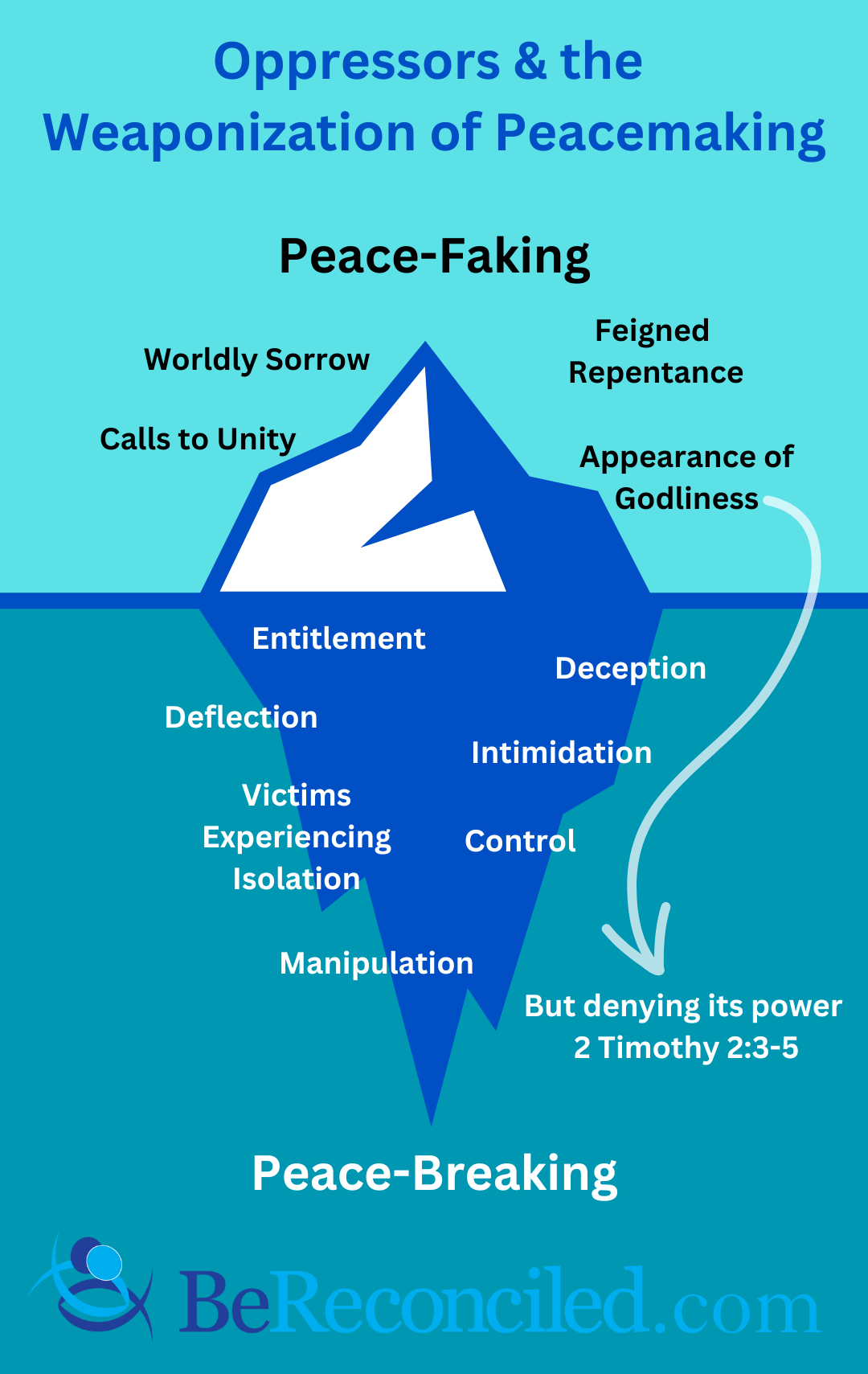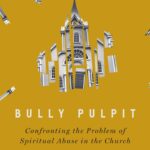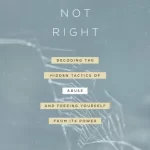Counterfeits. We need to be able to detect them in order to not be defrauded and victimized. Take counterfeit money for example. It imitates the real thing, but is not real. If you are fooled, you’ll suffer harm. The $100 dollar bill you just handed me to pay for my $10 widget better not be printed from your home printer! Not only would I lose my widget if defrauded, I’ll be out $90 dollars in change. Wisdom would have me verify the integrity of the bills you tender me before conducting business as usual.
Likewise, we should not be naïve about the presence of counterfeit peacemakers. Wisdom calls us to avoid being defrauded by those who would try to capitalize on the currency of Biblical peacemaking. An oppressor may try to pass off counterfeit peacemaking as the real thing. While it presents as peacemaking, it’s only an illusion meant to deceive others and ‘keep the peace’. Jeremiah says it this way: “From prophet to priest, everyone deals falsely. They have healed the wound of my people lightly, saying ‘peace, peace,’ when there is no peace. Were they ashamed when they committed abomination? No, they were not at all ashamed; they did not know how to blush” (Jeremiah 8:11-12, ESV).
Abusers have the ability to take advantage of other people’s good desires to their own advantage. In the context of domestic abuse, an abuser may take advantage of a wife’s love for her children or husband. In the workplace, it could be an employee’s desire to do a good job and get promoted. In Christian environments, it may be the good God-honoring desire to be at peace with all men or to think the best about others and seek the unity of the church. These are all good things that abusive people will exploit to manipulate and control others.
True peacemaking is a rich currency that brings glory to God, but those that weaponize peacemaking attempt to bring glory to themselves. If we are to glorify God and love both the oppressor and the oppressed, we must recover true Biblical peacemaking and call others to gospel integrity. God is not mocked. He practices steadfast love, justice, and righteousness, and those that practice spiritual abuse by weaponizing peacemaking will be held accountable.
Counterfeit Peacemaking: No Shame for Abomination
What are the distinguishing marks of counterfeit peacemaking by oppressors? As Jeremiah lamented, counterfeit peacemakers have no true godly shame over their abominations. Peacemaking is a useful tool to get people to avoid looking at the iceberg hidden beneath the surface. But if you look closely, you’ll see that those who weaponize peacemaking do not really know how to blush, to have proper godly guilt and shame that leads to repentance and life. Despite their appearance as agents of healing, peacefakers cannot heal the people’s wounds. They carry the aroma of death and leave a trail of wounded sheep.
In reality, charming oppressors with smooth words are simultaneously both peacebreakers and peacefakers. Their peacefaking usually comes after they have broken the peace. The prophet Jeremiah describes them this way: “Their tongue is a deadly arrow; it speaks deceitfully; with his mouth each speaks peace to his neighbor, but in his heart he plans an ambush for him” (Jeremiah 9:8). We are warned that an oppressor may speak graciously but it may be a trap with ‘peace’ as the lure! His words don’t reflect the true hidden intentions of his heart, which is ambush. (See also Proverbs 26:24-26.)
Adding guilt upon guilt, counterfeit peacemaking becomes a tool of both deception and oppression. It amounts to “heaping oppression upon oppression, and deceit upon deceit” (Jeremiah 9:6). It becomes a tool to cover over sin and avoid accountability. Look beneath an apologizer’s stream of tears to see if you smell the foul aroma of worldly sorrow or the fragrance of true godly sorrow and repentance.
Wade Mullen recently tweeted,
The counterfeit peacemaking of oppressors seeks to capitalize on the good graces of the audience and is a form of manipulation. When an oppressor claims he has made peace or attempted to make peace, look to see if there is a trail of injured and silenced sheep. We love not in words or speech, but in action and in truth. (1 John 3:18.)
Spotting the Weaponization of Peacemaking in Spiritual Abuse
In ‘regular’ conflict, parties in conflict will have a tendency to peace-fake and peace-break, to fight or flight. However, in an abusive relational system, peacemaking is abused and misused as a weapon to further oppression. It becomes another tool in the abuser’s toolbox. How do we know when peacemaking is being weaponized by an oppressor and being used as a tool of spiritual abuse? How do we distinguish the weaponization of peacemaking by abusers from sloppy peacemaking?
The Psalm 82 Initiative reminds us that we should not see abuse as an isolated event, but rather look for an abusive relational system. Borrowing language from the Psalm 82 Initiative’s 4 Tools Course, let us look at the counterfeit peacemaking methods of oppressors. When peacemaking is weaponized as a tool of oppression, we’ll see peacemaking misused as a tool of 1) isolation, 2) deflection, 3) manipulation and 4) intimidation:
Isolation: Oppressors abusing peacemaking will often use Matthew 18 as a tool of isolation. If you have a grievance with an oppressor, you are told not to talk to others in the church, because that would be gossip. Instead, you are to go one on one to face your oppressor before anything else. Matthew 18, a beloved passage of Scripture, becomes a yoke on the oppressed and a way for the oppressor to avoid accountability, turning the community accountability aspect of Matthew 18 on its head.
Oppressors promote unity in a way that calls for misplaced loyalty to the tribe. It is a counterfeit unity, one enforced with fear and legalism, lacking gospel freedom and love. The oppressed become isolated and are afraid to speak the truth or even process reality with others. They do not know who to trust and who to turn to for help. Wounded sheep suffer in isolation until being cast out of the community.
Instead of being like Jesus going after the lost sheep, the oppressor says, “Get on the bus or get run over and left behind.” Jesus did the opposite of isolating, he went outside the camp for us to bring us into communion with God and loving community.
Deflection: In deflection, the oppressor deflects negative attention away from himself and places the blame on others. He seeks positive attention for himself. He controls the narrative so that he looks like the peacemaker when in reality he is both a peacebreaker and peacefaker.
In Wade Mullen’s recent post, “Discrediting the Truth Tellers,” Mullen explains the DARVO (Deny, Attack, Reverse Victim and Offender) tactics of oppressors this way:
“… the abusive person or organization might give others the impression that they are the ones who have taken a difficult high road of pursuing peace, inviting reconciliation, letting go of the past, demonstrating love, and promoting unity.
This rotating of the map simultaneously gives the impression that those speaking truth to power have taken the easy low road of pursuing revenge, rejecting reconciliation, spreading gossip, harboring bitterness, demonstrating hate, and promoting division.”
The oppressor will not take proper responsibility for his abominations. The reality is that abuse is divisive. But abusers project their own sins as the sins of others. It is most ironic when an oppressor labels others as greedy, power hungry, divisive, slanderous, and deceitful. This deflection heaps “oppression on oppression and deceit on deceit.” While oppressors deflect shame and guilt onto others, Jesus calls out religious leaders as the ones who are blind and appropriately reassigns responsibility that has been misplaced (John 9:38-41, Matthew 23:24-26).
Manipulation: This can be done by (mis)using grace and forgiveness to avoid accountability. Counterfeit repentance becomes a tool of manipulation for an oppressor to get what he wants. If you look closely, you’ll hear concessions, acknowledging what cannot be denied, but not real penitent confessions that are complete in taking responsibility for all wrongdoing. Worldly sorrow is presented as godly sorrow. There is a form of godliness but a denial of the power of the gospel to change.
Oppressors play on the guilt of a sensitive conscience through misusing scripture and gaslighting to get apologies from others, all the while avoiding true accountability themselves. They might say, “Please meet with me to practice Biblical peacemaking.” If the oppressed actually meet with the oppressor, the oppressed will be asked to get the specks out of their eyes while planks remain in the eye of the oppressor. “You ruined my reputation, now apologize.” With all the gaslighting, the oppressed may end up apologizing for holding an oppressor accountable, all while the anger, entitlement, and coercive control of the oppressor remains hidden and unaddressed.
In true biblical peacemaking, confession brings freedom and healing to all parties. However, in an abusive relational system, confession to an oppressor is dangerous for the one being oppressed. Confessed sins will be used against you as blackmail later but the oppressed are expected to forgive (and trust) the oppressor unconditionally. Confession to an oppressor brings bondage, but in Jesus, we find true pardon for sin. In Jesus we find no deceit or malice (1 Peter 2:22-24).
Intimidation: Oppressors will weaponize church discipline and inappropriately proclaim God’s judgment on others. “Matthew 18” becomes a tool of fear rather than a tool of love. Like Diotrephes in 3 John 1:9-10 or the Pharisees in John 9:34, oppressors will cast out those they can not control. “Reconciliation meetings” will be coerced and look more like a “compliance roulette” than a place of gospel freedom. The Lord’s table will become the oppressor’s table. Submit to me or be denied the privileges of being in Christ’s body. Scripture will be twisted and weaponized to give leaders a privileged status. You’ll see rules for thee but not for me. This is the opposite of love. In Christ’s love, there is no fear. But oppressors rule with fear. (1 John 4:18)
Reframing The Narrative: “Calling Out Oppression is Peacemaking”… Purity Precedes Peace
In some churches there is a membership vow where members promise to study and promote the “purity and peace” of the church. Notice the order. I am reminded of James 3:17: “But the wisdom from above is first pure, then peace-loving, gentle, reasonable, full of mercy and good fruits, impartial, free of hypocrisy”(NASB). Purity precedes peace. You can’t have true peace and shalom without purity.
Put another way, what fellowship can righteousness have with unrighteousness?
We must flip the narrative. “Heaping oppression upon oppression and deceit upon deceit” is divisive. Those calling out oppressors and counterfeit peacemakers are the true peacemakers.
The weaponization of “peacemaking” by oppressors is anything but peace-loving, gentle, reasonable, impartial, and free of hypocrisy. Abusers and oppressors cause division by their self-love, greed, deceit, hypocrisy, and treachery. Telling the truth may be peacemaking. Silence and neutrality may be complicity. To remain silent may be sin, but sometimes silence is wise until there is safety.
To be a good peacemaker, don’t be afraid of conflict and exposing sin and evil. Dealing with abuse may make you a target. Those who confront abuse may be labelled with a spirit of dissension. But make no mistake, exposing oppression may be peacemaking and exalting the gospel of peace.
Spiritual Abuse is a Gospel Issue: Abuse Denies the Need For and Power of the Gospel
Spiritual abuse is a gospel issue. Jesus came to proclaim freedom to the oppressed. He came to set captives free from slavery to sin. Oppression and the gospel are antithetical. Those that practice spiritual abuse misappropriate the voice of God to serve their own entitlement and self-idolatry.
- Abusers deny their need for a Savior by denying their sin. In essence, they say, I don’t need to repent of my entitlement, greed, love of self, and ungodly use of power. I’ll just repent of any presenting issues that are undeniably obvious.
- Abusers deny the power of the gospel to change them with their feigned repentance. There is a form of godliness but not the substance. The gospel brings truth and light, but counterfeit peacefaking by oppressors is used to hide the truth with deception. They have an appearance of godliness but deny the gospel’s power. In reality, they are abusive, without self-control, lovers of self, proud, unforgiving, slanderous, brutal, conceited, arrogant and treacherous. Timothy tells us to have nothing to do with such people (2 Timothy 3:1-5).
Food for Thought:
Pastor Tom at the Psalm 82 Initiatives says,
“The abuser wants the worship that belongs to God, the authority that is given to Christ, and the control that is reserved for the Holy Spirit. The religious abuser will try to (mis)use Scripture to usurp the place of God in their victim’s life. IMPORTANT: No command of Scripture can rightfully be used to demand worship, lordship, or control.”
If we are to be true peacemakers, we must worship God, see his word as our guiding authority, and be controlled by the Holy Spirit instead of men.
Related Links:
- The Many Odd Uses and Abuses of Matthew 18 by Professor Keith Evans
- The abuse of peacemaking and Matthew 18 is well documented. Ken Sande, the author of The Peacemaker who once promoted binding Christian Conciliation clauses has reversed course on binding conciliation clauses in the church context because of the problem of the abuse and weaponization of peacemaking.
- Why Defining Gossip Matters in the Church’s Response to Abuse by Christianity Today







